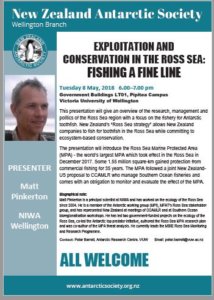Time: 6:00 pm - 7:00 pm
Government Buildings LT01, Pipitea Campus, Victoria University of Wellington
New Zealand Antarctic Society
Wellington Branch
www.antarcticsociety.org.nz
EXPLOITATION AND CONSERVATION IN THE ROSS SEA: FISHING A FINE LINE
Tuesday 8 May, 2018 6.00–7.00 pm Government Buildings LT01, Pipitea CampusVictoria University of Wellington
This presentation will give an overview of the research, management and politics of the Ross Sea region with a focus on the fishery for Antarctic toothfish. New Zealand’s “Ross Sea strategy” allows New Zealand companies to fish for toothfish in the Ross Sea while committing to ecosystem-based conservation. The presentation will introduce the Ross Sea Marine Protected Area (MPA) – the world’s largest MPA which took effect in the Ross Sea in December 2017. Some 1.55 million square-km gained protection from commercial fishing for 35 years. The MPA followed a joint New Zealand-US proposal to CCAMLR who manage Southern Ocean fisheries and comes with an obligation to monitor and evaluate the effect of the MPA. Biographical note:Matt Pinkerton is a principal scientist at NIWA and has worked on the ecology of the Ross Sea since 2004. He is a member of the Antarctic working group (MPI), MFAT’s Ross Sea stakeholder group, and has represented New Zealand at meetings of CCAMLR and at Southern Ocean bioregionalisation workshops. He has led two government-funded projects on the ecology of the Ross Sea, co-led the Antarctic top predator initiative, authored the Ross Sea MPA research plan and was co-author of the MPA threat analysis. He currently leads the MBIE Ross Sea Monitoring and Research Programme.
Contact: Peter Barrett, Antarctic Research Centre, VUW
Email: [email protected]
ALL WELCOME

